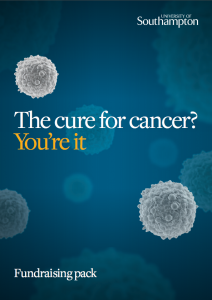The University of Southampton’s international reputation for translational research was one of the major attractions for Professors Sally Ward and Raimund Ober when deciding to return to the UK.
For more than 40 years Southampton scientists have been pushing the boundaries of cancer immunology research in both the laboratory and clinic.
Much of Sally and Raimund’s work to date has used antibody engineering, fluorescence microscopy and mouse models, leading to potential antibody-based therapeutics that have been moved into clinical trials through licensing to pharmaceutical companies. Being based at the Centre for Cancer Immunology is expected to allow Sally and Raimund to be closely involved in translating their technologies to the clinic.
Sally said: “In Southampton we can see our working model of making engineered antibodies, studying their cellular behavior and then testing in mouse models being translated to the clinic in collaboration with the clinicians and Clinical Trials Unit. This possibility was a major attraction – this Centre is so translational, and we hope to be able to move our research further along the clinical line than we have done in the past. In Southampton the hospital is so close, and we are working alongside clinicians every day which greatly facilitates translation.”
Sally and Raimund joined the Centre from Texas AM University last year and will be heading up a joint multidisciplinary laboratory.
Professor Sally Ward,Southampton is known throughout the world for fundamental scientific discoveries that positively impact patient treatments.
Sally’s main field of research involves finding new ways to engineer antibodies to help them destroy cancer cells and understanding how the cancer cells respond to different types of antibodies.
Using advanced microscopy techniques, Raimund’s expertise lies in developing new super-resolution imaging techniques to study, for example, the fate of therapeutic anti-cancer antibodies as they attack cancer cells. This research is expected, in combination with Sally’s antibody engineering approaches and mouse model work, to result in antibody-based drugs that are delivered to the appropriate compartments within cells to lead to positive therapeutic effects in patients.
Their pre-clinical research will mainly focus on breast and prostate cancers, with the goal of also expanding to other cancers such as blood cancers and head and neck cancer in collaboration with Southampton researchers/clinicians – extending Southampton’s immunotherapy research programmes which also include lung cancer and neuroblastoma.
They have already been successful in obtaining two key grants to start their research. A £2.2million grant from Cancer Research UK will fund a study to develop ways of improving the efficiency with which antibody-drug conjugates deliver toxic drugs to cancer cells. Combining their antibody engineering and microscopy expertise, Sally and Raimund hope to develop platform technologies that can be applied to multiple cancer types that are not responsive to current immunotherapy or antibody-drug conjugate treatments.
Professor Raimund Ober,We are extremely grateful for all the support since we have come to Southampton.
A £2.7million grant from the Wellcome Trust will enable Sally and Raimund to study macrophages, large white blood cells that are an integral part of our immune system. Macrophages destroy foreign bodies by ‘eating’ them, and in addition to being able to engulf tumour cells, can also interact with T cells to stimulate anti-tumour immunity. The study aims to examine how antibodies behave within these cells, with the overall goal of using this information to design molecular approaches to improve the immune response against tumours during immunotherapy.
The Centre for Cancer Immunology was funded entirely through philanthropic donations, something which has greatly impressed both Sally and Raimund.
Sally said: “ The development of this Centre is exciting and to know that it was funded through people’s donations is extremely special.”
“It’s great to meet the people who donated to the campaign and also for them to have opportunities to visit the Centre and hear about the ongoing research that they have so generously contributed towards. It’s always interesting to hear the stories of the donors and why they decided to donate. I think it’s also important for early career researchers such as post-doctoral fellows and students to meet the donors. It is a privilege to work in a Centre that is so well supported by philanthropic donations.”
